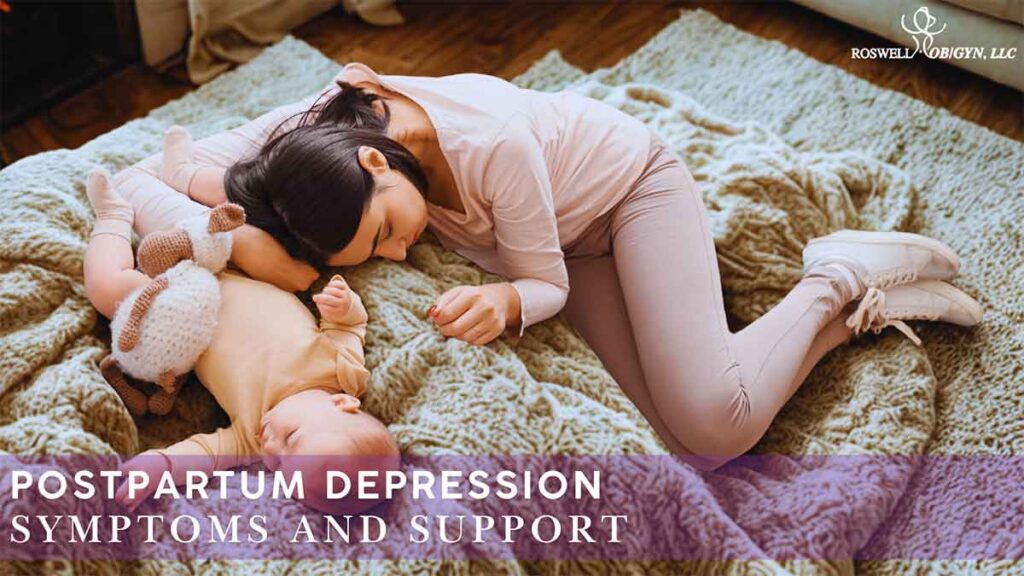
Postpartum depression is a serious medical condition affecting 10–15% of new mothers. It extends beyond the emotional fluctuations of childbirth and presents as persistent sadness, fatigue, anxiety, and difficulty bonding with the baby.
These PPD symptoms can impair daily functioning and maternal health if left unaddressed. Prompt recognition and intervention are essential for reducing long-term psychological effects and improving recovery.
Specialized OBGYN care plays a vital role in managing postpartum mental health. Through early screening during prenatal care and ongoing postpartum evaluations, healthcare providers can identify individuals at risk and tailor care plans accordingly.
Effective management includes clinical assessment, therapy referrals, and continuous follow-up. Supportive and respectful care helps ensure mothers receive the help they need while preserving autonomy and emotional well-being.
Understanding Postpartum Depression
Postpartum depression represents a complex mood disorder that emerges after childbirth, distinctly different from temporary emotional adjustments many new mothers experience. This condition creates lasting changes in how you feel, think, and function daily, often intensifying rather than improving with time. The biological foundation stems from dramatic hormonal shifts as estrogen and progesterone levels plummet after delivery, disrupting neurotransmitters that regulate your emotional state.
Your risk factors extend beyond hormonal changes to include sleep deprivation, physical recovery demands, and major life transitions. Previous mental health episodes, complicated pregnancies, or limited social connections can heighten vulnerability. Women recovering from high-risk pregnancies often face additional stressors, making early identification and postpartum depression support crucial for overall well-being.
Recognizing Diverse Symptoms
Postpartum depression manifests through interconnected emotional, cognitive, physical, and behavioral changes that create complex challenges in your daily life. These indicators often develop gradually, making them difficult to distinguish from normal postpartum adjustments without professional evaluation. Understanding these varied presentations helps you recognize when temporary struggles have evolved into something requiring clinical attention and specialized care interventions.
Emotional and Mental Indicators
Postpartum depression can present with a range of emotional and mental symptoms, including:
- Persistent sadness, hopelessness, and feelings of inadequacy: Many women experience ongoing emotional distress that doesn’t ease with time.
- Internalized guilt and shame: Some women feel like failures as mothers, even when they are providing appropriate care for their baby.
- Co-occurring anxiety: This may involve disproportionate fears about infant safety, maternal competence, or uncontrollable outcomes. It can cause hypervigilance, irritability, and physical symptoms such as tension or restlessness.
- Cognitive difficulties: Common effects include difficulty concentrating, poor memory, and impaired decision-making, often described as feeling mentally “foggy” or unable to complete familiar tasks.
- Intrusive thoughts: In more severe cases, women may experience distressing thoughts related to self-harm or infant safety.
- Emotional detachment: Difficulty bonding with the baby or feeling emotionally numb often compounds these feelings, increasing isolation and delaying recovery.
These symptoms are common in postpartum depression, but they must be carefully assessed by trained OBGYN specialists to distinguish between passive distress and clinical risk. Early intervention is key to breaking cycles of self-criticism and emotional isolation.
Physical and Behavioral Signs
Postpartum depression (PPD) can manifest in ways that often get overlooked as typical postpartum changes, leading to delayed diagnosis. The physical symptoms of PPD may include:
- Persistent fatigue: While tiredness is common after childbirth, PPD-related fatigue doesn’t improve with rest. Women may feel drained even after getting enough sleep, which often impacts their ability to care for themselves and their newborn.
- Appetite changes: Loss of appetite or overeating unrelated to breastfeeding needs can indicate emotional distress. For some women, these changes in eating habits may signal an underlying mood disorder.
- Aches and pains: Chronic pain, especially in the back, joints, or abdomen, that doesn’t seem to resolve can be a physical manifestation of depression. These discomforts often prevent women from engaging in everyday activities, compounding their emotional burden.
- Sleep disturbances: Sleep issues go beyond just being tired. Women with PPD may experience insomnia, even when their baby is sleeping, or excessive sleep that still leaves them feeling unrested. This irregular sleep pattern can interfere with recovery and worsen mental health symptoms.
- Gastrointestinal issues: Chronic headaches and stomach discomfort are frequent complaints, further complicating a woman’s ability to manage daily tasks, especially if she is recovering from a high-risk pregnancy or complicated delivery.
In addition to these physical manifestations, behavioral changes may signal the progression of PPD, affecting a woman’s ability to interact with her environment:
- Social withdrawal: Women with PPD may begin to isolate themselves from family, friends, and their support network. What once felt like normal socializing becomes draining, leaving them reluctant to engage or share their struggles.
- Decline in hygiene or grooming: A lack of interest in personal care, such as neglecting regular grooming or personal hygiene, can be an indicator that a woman is struggling with her mental health. This behavior reflects the emotional toll of PPD.
- Emotional volatility: Increased anger, tearfulness, or irritability can disrupt relationships and create a sense of disconnection from loved ones. These emotional shifts are often out of proportion with the situation and leave women feeling overwhelmed and misunderstood.
- Avoidance of support systems: Women may feel undeserving of help, leading them to turn away from supportive partners or friends. This belief can perpetuate isolation and intensify feelings of guilt and shame.
Recognizing these physical and behavioral signs early is crucial for effective intervention. Proper care within a trusted OB/GYN clinic, including structured postpartum depression support and individualized treatment plans, can help reduce the duration and intensity of symptoms. With the right approach, women can regain a sense of stability and move toward a healthier recovery.
Essential Support Pathways
Recovery from postpartum depression requires a comprehensive approach that addresses your unique circumstances, medical history, and personal preferences for healing. Professional intervention forms the cornerstone of effective treatment, utilizing evidence-based strategies tailored to your specific presentation and severity level. This coordinated care model ensures you receive appropriate resources while maintaining your autonomy throughout the recovery process.
Professional Medical Guidance
Effectively managing postpartum depression (PPD) requires a personalized treatment plan that addresses both the emotional and physical aspects of recovery. Treatment options typically include psychotherapy, medication, or a combination of both, depending on the severity of symptoms and individual preferences.
- Psychotherapy: Cognitive-behavioral therapy (CBT) and interpersonal therapy (IPT) are commonly used to help women identify and change negative thought patterns. These therapies are valuable for managing feelings of hopelessness, adjusting to maternal identity, and navigating relationship and caregiving challenges. Both individual and group therapy formats provide emotional support and coping strategies.
- Medication: For more severe symptoms or when therapy alone isn’t sufficient, SSRIs (selective serotonin reuptake inhibitors) may be prescribed, as they are generally safe for breastfeeding mothers. These medications help balance brain chemicals that influence mood and reduce feelings of sadness and anxiety. It’s important for OBGYN specialists, psychiatrists, and prenatal care providers to collaborate to tailor the medication to the patient’s needs.
- Ongoing Care and Adjustments: Recovery from PPD is unique to each woman, so regular follow-up visits are necessary. These appointments allow healthcare providers to assess progress, make adjustments to treatment, and provide continued support. Recovery timelines vary, and flexible, adaptable strategies are essential for sustained improvement, ensuring that women not only manage immediate symptoms but also build long-term coping skills.
Building Your Support Network
Recovering from postpartum depression (PPD) requires a strong support network. Partners, family, and friends can assist with tasks like childcare and meals while offering emotional reassurance during this challenging time. Open communication about your needs and limits is crucial to ensuring that support is effective and respectful. Educating loved ones about PPD fosters understanding and empathy. Additionally, peer support groups provide connection and shared experiences, and local services, such as doulas, lactation consultants, and home care providers, offer practical help. Cultural or faith-based communities can also provide emotional and practical support.
Prioritizing Self-Care for Recovery
Self-care practices during postpartum depression recovery require intentional attention to both physical restoration and emotional nourishment. These wellness strategies may initially feel challenging during acute depressive episodes, but implementing small, manageable steps creates momentum toward improved well-being. Your OBGYN care providers offer practical guidance for developing sustainable routines that complement your treatment plan without creating additional pressure.
Strategies for Physical Well-being
Prioritizing your physical health is an essential part of postpartum depression (PPD) recovery. Here are key strategies to support your recovery:
- Light exercise: Engaging in gentle activities like walking or yoga helps improve mood by increasing serotonin levels and lowering stress hormones such as cortisol. Start slowly and gradually increase intensity with medical guidance, adapting to your energy levels and recovery pace. Many new mothers benefit from morning movement routines or joining postnatal fitness groups that offer both physical and social support. These activities improve energy, mental clarity, and emotional resilience during the recovery period.
- Proper nutrition: A balanced diet is crucial for physical recovery. Nutrient-dense meals rich in protein, complex carbohydrates, and healthy fats help regulate energy levels and support neurotransmitter balance. For mothers experiencing PPD, having help with meal preparation from family, friends, or meal delivery services can ease the burden and ensure you’re eating well.
- Hydration: Staying hydrated, particularly during breastfeeding, helps prevent fatigue and mood instability. Drinking plenty of water supports both physical and emotional health during the recovery period.
- Rest and sleep improvement: Adequate rest is essential. Strategies like resting when your baby sleeps and sharing nighttime duties with your partner can improve sleep quality and emotional stability. These practices are often reinforced through regular OBGYN check-ups, ensuring you stay on track with both physical and emotional care.
By integrating these strategies, you can significantly improve your overall well-being during postpartum recovery. Remember, each woman’s journey is unique, so it’s essential to tailor these approaches to your personal needs and recovery pace.
Nurturing Mental Health Practices
Taking care of your mental health during postpartum depression (PPD) recovery is just as important as physical well-being. Here are effective strategies to support your emotional health:
- Mindfulness techniques: Practices like breathing exercises, progressive muscle relaxation, and brief meditations can be incorporated into daily routines, such as while feeding or walking. These techniques reduce stress, improve emotional regulation, and help you focus on the present moment rather than negative thought patterns. Regular mindfulness practice helps lower rumination, a common symptom of PPD.
- Journaling: Writing can be an invaluable tool for emotional processing. It provides a safe space to track mood changes, explore personal challenges, and even focus on gratitude or goal-setting. Journaling clarifies thoughts, offers emotional release, and provides a sense of control over your recovery process.
- Creative outlets: Engaging in creative activities like art, music, or crafts provides positive distraction and supports self-expression. These activities help restore a sense of identity beyond caregiving and can promote healing by allowing you to explore emotions in a healthy way.
By integrating these nurturing practices into your daily life, you can actively support your mental wellness and emotional resilience throughout your postpartum recovery.
Roswell OB/GYN: Your Trusted Partner
Roswell Ob/Gyn, LLC provides specialized support for postpartum depression through comprehensive, evidence-based care across Alpharetta, Atlanta, Canton, and Cumming. Our team understands the challenges new mothers face and offers personalized treatment that addresses both immediate symptoms and long-term well-being.
We use validated screening tools during postpartum visits, maintain consistent follow-ups, and tailor care plans based on individual risk factors, including those related to high-risk pregnancies and complex deliveries. Patients benefit from our integrated care model, which includes collaboration with mental health providers, pediatricians, and lactation consultants to ensure complete, coordinated support.
In addition to mental health care, we offer a full range of women’s health services, including prenatal care, fertility support, gynecological exams, and minimally invasive treatments. Our OBGYN clinic prioritizes patient education, cultural sensitivity, and individualized care at every stage. If you’re experiencing symptoms or need to discuss your concerns, please reach out to Roswell Ob/Gyn, LLC, to schedule a confidential appointment with our experienced team.



